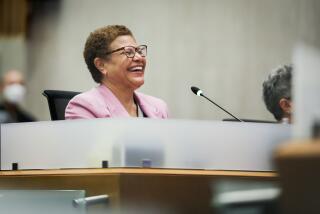Low-profile politician in line for high-status job
- Share via
NEW YORK — When Eliot Spitzer tapped him as his running mate during his gubernatorial run two years ago, David Paterson agreed to take the low-profile job.
For more than a year after their win, the lieutenant governor toiled in the shadows of the brash governor, reaching out to state Republicans when Spitzer chose to fight.
But the spotlight may soon come to the relatively unknown politician whom observers describe as a contrast in character to his boss.
If Spitzer resigns in an unfolding sex scandal, Paterson, 53, would be his successor, becoming the first African American governor of New York.
A 2006 profile in the New York Observer described Paterson as a “mystery man.”
“Nobody knows a lot about him,” said Hank Sheinkopf, a longtime New York political consultant who worked on Spitzer’s 1998 attorney general campaign. Sheinkopf, who has followed Paterson’s career and knows him socially, describes him as a politician more likely to cross the aisle than Spitzer.
Unlike his boss, Paterson “is not a confrontational guy,” Sheinkopf said. “Because he has served in the Legislature, he understands it -- something Eliot Spitzer does not.”
Paterson, who is legally blind, grew up in a political family and was first elected to the state Senate in 1985, representing a district that includes Harlem.
During his time in the Senate, Paterson developed an amicable relationship with Joseph L. Bruno, the Republican majority leader -- a marked contrast to the governor, who has fought a long, bitter and public war of words with Bruno. (Last year, Spitzer’s office was investigated for using state police to gather information on Bruno.)
During his first year in office, Paterson’s stated priorities as lieutenant governor were alternative energy, stem cell research, and helping women and minorities. Last year, he led a successful legislative effort to approve a bond issue that directed at least $1 billion toward stem cell research.
“My leadership will demonstrate the ability to work against the odds,” Paterson told a local New York newspaper in 2002, the year he was elected Senate minority leader, the highest statewide office held by an African American official in New York at the time.
Before becoming a state senator, Paterson worked for former Mayor David Dinkins, who was then running for borough president of Manhattan.
In 2004, Paterson addressed the Democratic National Convention, and recently he has campaigned with Sen. Hillary Rodham Clinton as she seeks the presidential nomination.
Paterson, who also teaches as an adjunct professor at Columbia University, was born in Brooklyn, the son of Basil A. Paterson, a prominent New York politician. In 1977, he received a bachelor’s degree from Columbia University and a law degree from Hofstra Law School. He didn’t pass the bar exam, however.
Early official biographies of Paterson incorrectly stated that he grew up in Harlem and passed the bar exam. When the discrepancies were discovered, the politician said he had neither written nor read his own biography in what is known as the Red Book, the official directory for politicians in the state.
Paterson, who was born with partial vision in his right eye and is fully blind in his left eye, lives with his wife, Michelle, and their two children in Harlem.
Beyond arriving at the governor’s mansion under unusual circumstances, Paterson would face a series of fundamental problems, including a budget marked with red, a state Senate where Republicans hang on to the majority by one seat and a government in Albany that Sheinkopf calls a “confrontational arena.”
“He’s going to have to rise to the occasion,” Sheinkopf said. “Can he? Yes, he can.”
--
More to Read
Sign up for Essential California
The most important California stories and recommendations in your inbox every morning.
You may occasionally receive promotional content from the Los Angeles Times.










